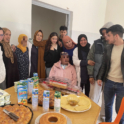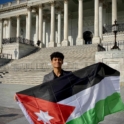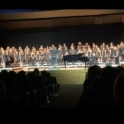Maryame has taken the lessons learned from her exchange year to make a difference in her community.
STORIES
YES Alumni Grant: The Clean City Project
By Alieu J. Pusah (YES 2017-2018, Liberia, placed with AFS in Chicago, IL)
The YES program was the year of my true definition — defining me by who I was before YES, who I became while on program, and who I would become beyond YES. While on program, I came to realize that service to humanity can help us achieve many goals. YES was a year of mastering new skills. It was filled with love, generosity, and most of all — independence. Upon first meeting my host dad, his warm hug reassured me of my safety and wellbeing. My host dad has always supported me unconditionally. He always encourages me to strive for my dreams and put forth my best effort. My time with my American host family, friends, and classmates taught me to take responsibility for my education and that all dreams are possible if one is dedicated. These individuals have contributed to what I am becoming. Their courage and advice have challenged me to work to solve some of the world’s pressing problems, such as environmental degradation. I’m currently studying Environmental Science at the African Methodist Episcopal University in Liberia.
In Liberia, the challenges of widespread poverty and high inflation have stunted economic growth. Urbanization has also produced a great deal more waste, with 50% of the population now living in the greater Monrovia area, where garbage can be seen all along the streets and in open dumpsites. Plastic waste makes its way into our rivers and, subsequently, the ocean, affecting marine life and endangering the health of all living things and the Earth.
I decided to apply for a YES Alumni Grant to help address some of the environmental challenges my community and country face. The biggest need I saw was for education and awareness to encourage the local community to keep their environment clean and safe, so I designed The Clean City Project and applied for — and received — YES Alumni Grant funding to carry it out.
The Clean City Project was a workshop that educated 60 young people in the West Point community about managing their waste properly. Sessions were developed and delivered by me and my team, as well as by experts in the field of waste management. Participants were also taught the importance of volunteerism and how to be an ambassador for the environment. Participants were trained to engage others in their community on these issues, and the workshop concluded with a field engagement session, in which they talked to community members about what they learned and how everyone must work together to solve waste management problems.
Through this project, we built a strong network among participants and prepared them to educate the community on waste management in order to avoid bigger environmental problems. In a post-workshop survey, 97% of participants reported that the workshop was a game-changer for them, and that they are now more aware of their actions and what effect it has on the environment.
In organizing this project, I learned a lot from both the participants and my team. Our team was supportive and courageous, and they were always available whenever they were needed. Ultimately, this project was successful because of the hard work my team and I put into it. Also, the schools we coordinated with and community were instrumental to making sure the project was a success.
We hope our participants will continue spreading what they’ve learned with the establishment of environmental clubs at their various schools and in the community. We are working with our partners on their continued support of the project as we hope to extend the program to other parts of Liberia.





